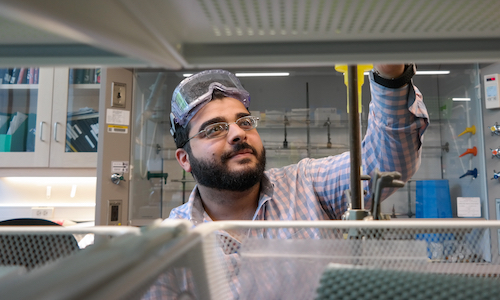
For John Cristiano, undergraduate research ranks as one of the campus’ most undertold—and undersold—stories.
“I think one of our challenges is that, to the outside world—and maybe even to the campus—it might look like we don’t have an undergraduate research program,” said Cristiano, director of Research Development and Sponsored Program Administration. “But the truth is there’s always been a lot of undergraduate research. It’s just been happening in pockets all around campus—and we don’t always sing about it.”
So this spring, Cristiano, Marilee Benore, Amanda Esquivel, DeLean Tolbert, Yunus Zeytuncu, and Associate Provost Ilir Miteza got together and started thinking about ways to tie some of those threads together. One of the ideas they came up with was a pilot Summer Undergraduate Research Experience (SURE)—where, per usual, students would work alongside faculty on research projects. What’s new is that they’d expand funding to support more students, and students would get a more guided experience—complete with a series of skill-building workshops, research best practices trainings, and chances to meet and share work with their fellow summer researchers.
The Office of Research and Sponsored Programs, CASL and CECS all kicked in funding to support the inaugural cohort of 27 students, who are now immersed in all kinds of interesting projects. Over in Associate Professor Sheila Smith’s biochemistry lab, Alhassan Hashem is attempting to untangle the mysteries of proteins that bind essential vitamins in eggs—work that he says could help build defenses against pathogen threats to the food supply. Meanwhile, across campus, Frederick Pruitt is assisting with Assistant Professor DeLean Tolbert’s work to identify the pathways that lead underrepresented minority students to STEM opportunities in higher ed.
For that, Tolbert is giving Pruitt some learn-by-doing experiences in foundational social science research practices, including literature reviews and statistics. It’s all new territory to the electrical engineering sophomore, who said the in-depth work is shaking up his own higher ed dreams.
“I don’t think I would even be thinking about graduate school if I wasn’t doing this work with Dr. Tolbert,” Pruitt said. “I’m OK with following directions, but I’ve always been a person who wants to find out things for myself. And that’s what research is really all about. So the experience has opened up a whole new way of looking at what I want to do with my education and my career.”
For Tolbert, getting students to reframe the way they think about and value research is much easier to do within the context of a unified program.
“When you're alone, working in isolation, you might think some professor you took a class with is just giving you an opportunity,” said Tolbert, who played a key role in designing the summer program. “But students might not realize that research keeps institutions going, and it can also influence society. And I think, for us, as an institution, having an undergraduate research program can help strengthen our research culture.”
In fact, ask Tolbert about the potential for the summer program and she’ll sell you on a vision of an interconnected undergraduate research community that extends far beyond campus. Other universities, for example, have grown these programs into summer experiences that draw students from across the country. And the ultimate measure of success, she said, might be when the student research culture is so strong here that UM-Dearborn students start straying from campus for their own research opportunities.
“The only downside is that once they find out that research is an option, and that they can get funded, we might have to fight hard to keep our own students here for the summer,” she said, smiling.
But that, Tolbert said, is one of those challenges you’d love to have.





